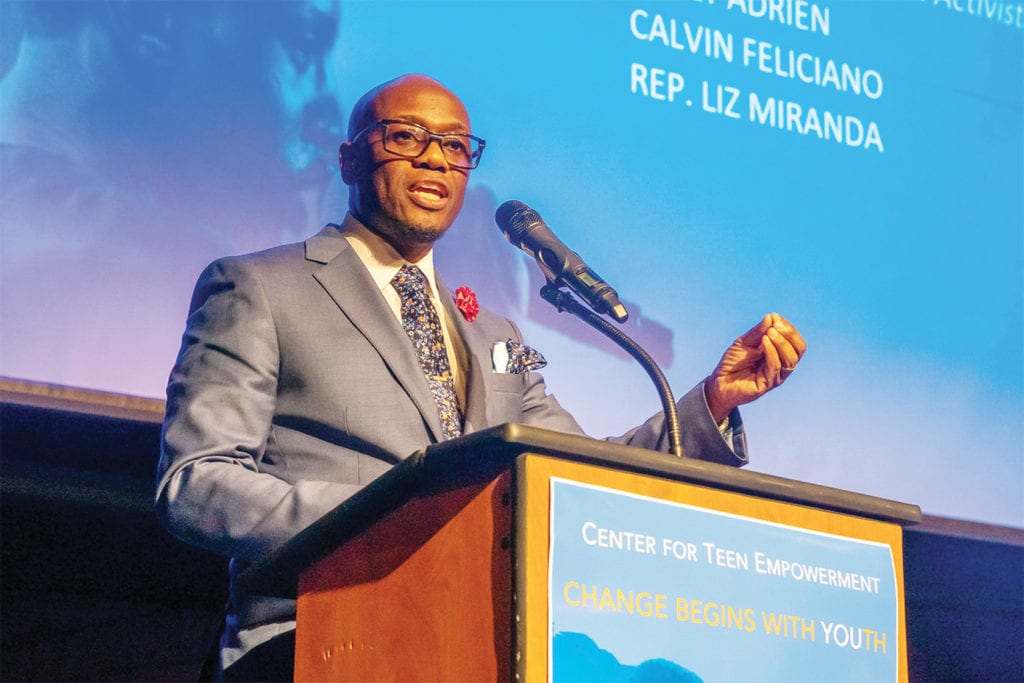
At just 21 years old, Abrigal Forrester was sentenced to 10 years in prison. Even though he was a first-time offender, his decade-long incarceration was due to a mandatory minimum sentence.
Forrester now leads a completely different life. Following his release, he spent 18 years in nonprofit youth development work. Today, he is the executive director of the Center for Teen Empowerment, an organization that helps low-income teenagers inspire their urban communities and advocate for change. Forrester helps these teenagers recognize their self-worth and envision crime-free communities.
“The concept of teen empowerment that we use … which is really having young people thinking about their values and beliefs … is actually the process I personally went through,” said Forrester. He was forced to confront his set of values after time in prison — values that he had acquired in order to survive.
“I adopted what I consider to be a street-corner value system,” said Forrester. These values eventually led Forrester down a bad path, he said.
Teens in low-income, crime-ridden environments often face severe trauma. Forrester said that many kids are responding to things that aren’t their fault.
“You’re just really rolling with your emotions,” he said. The Center for Teen Empowerment helps these teenagers assess possible strategies to avoid rash decisions.
“One of the keys is giving them this space, and asking them to take the time to think,” said Forrester. The young people are told to “take a step back … and let’s look at what’s happening in your life, in your community, from a 40,000-foot view.”
Once teenagers gain a clearer perspective, they can recognize the systemic issues that disproportionately affect their community. They can also look at policies to advocate against, said Forrester.
“The main thing we do is hire youth to unpack their own personal challenges, and then identify what are the issues that are impacting the community that they live in,” he said.
For instance, the teenagers take a deeper look at mental health and trauma. It’s a big issue for them, said Forrester, and there are many issues that subsequently compound this trauma.
Young people at Teen Empowerment also look at criminal justice reform, said Forrester, and how the juvenile justice system is impacting youth.
Stanley Pollack started the Center for Teen Empowerment in 1992. The center’s mission was to facilitate disagreements between different populations, said Forrester, as gangs ran rampant throughout the city. The center focused on youth intervention and violence reduction.
Today, the center has branches in Boston, Somerville and Rochester, New York. More than 120 young people are involved in hundreds of social initiatives, amounting to 5,000 community leaders participating in peace-building efforts.
“Our concept is paying young people to work on themselves and to look at the issues that are impacting their communities,” said Forrester. He later added, “They’re paid to be peer influencers … which allows them to go back to the communities that they come from … and organize events and activities to educate, make aware and make action — positive action.”
The Center for Teen Empowerment hosts various events to promote outreach. Forrester said that he’s currently working on a peace conference to kick off the summer. The peace conference is a compilation of events by the Center’s performing arts initiative. The performances encourage self-expression and inform the community about issues that impact youth.
Forrester, who took on the executive director role in 2019, has big plans for the center’s future. “What we hope to do, really, is to expand and partner with agencies that do great work (with) positive youth development,” he said. That includes partnering with local communities as well as regional expansion.
One of the goals, he says, is to “think about, ‘How do we move ourselves to be a nationally-based organization?’”
For now, the Center for Teen Empowerment will focus on giving young people a voice. With this voice, they can implement strategies and transform their communities.
“Those who are closest to the problems are the ones who understand the solutions,” Forrester said.






